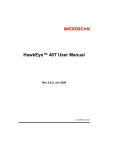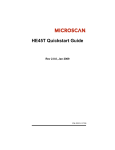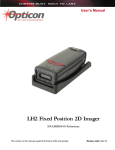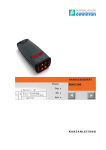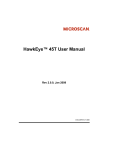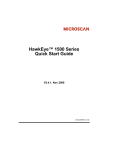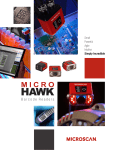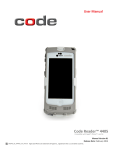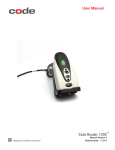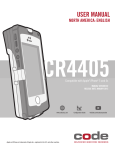Download Microscan HE40T Specifications
Transcript
HE40T Quickstart Guide Rev 2.0.0, Jan 2009 EM-20952-1V200 Copyright and Disclaimer Copyright ©2009 by Microscan Systems, Inc. 1201 S.W. 7th Street, Renton, WA, U.S.A. 98057 (425) 226-5700 FAX: (425) 226-8682 All rights reserved. The information contained herein is proprietary and is provided solely for the purpose of allowing customers to operate and/or service Microscan manufactured equipment and is not to be released, reproduced, or used for any other purpose without written permission of Microscan. Throughout this manual, trademarked names might be used. Rather than place a trademark (™) symbol at every occurrence of a trademarked name, we state herein that we are using the names only in an editorial fashion, and to the benefit of the trademark owner, with no intention of infringement. Disclaimer The information and specifications described in this manual are subject to change without notice. Latest Manual Version For the latest version of this manual, see the Download Center on our web site at: www.microscan.com. Technical Support For technical support, email: [email protected]. Microscan Systems, Inc. 1201 S.W. 7th Street Renton, WA 98057 U.S.A. Tel: 425 226 5700 Fax: 425 226 8250 [email protected] Microscan Europe Tel: 31 172 423360 Fax: 31 172 423366 Microscan Asia Pacific R.O. Tel: 65 6846 1214 Fax: 65 6846 4641 Microscan Limited Warranty Statement and Exclusions What Is Covered? Microscan Systems Inc. warrants to the original purchaser that products manufactured by it will be free from defects in material and workmanship under normal use and service for a period of one year from the date of shipment. This warranty is specifically limited to, at Microscan’s sole option, repair or replacement with a functionally equivalent unit and return without charge for service or return freight. What Is Excluded? This limited warranty specifically excludes the following: (1) Any products or parts that have been subject to misuse, neglect, accident, unauthorized repair, improper installation, or abnormal conditions or operations; (2) Any products or parts that have been transferred by the original purchaser; (3) Customer mis-adjustment of settings contrary to the procedure described in the Microscan Systems Inc. owners manual; (4) Upgrading software versions at customer request unless required to meet specifications in effect at the time of purchase; (5) Units returned and found to have no failure will be excluded; (6) Claims for damage in transit are to be directed to the freight carrier upon receipt. Any use of the product is at purchaser’s own risk. This limited warranty is the only warranty provided by Microscan Systems Inc. regarding the product. Except for the limited warranty above, the product is provided “as is.” To the maximum extent permitted by law, this express warranty excludes all other warranties, express or implied, including but not limited to, implied warranties of merchantability and. Technical support questions may be directed to: [email protected] Register your product with Microscan: www.microscan.com/register fitness for a particular purpose. Microscan Systems Inc. does not warrant that the functions contained in the product will meet any requirements or needs purchaser may have, or that the product will operate error free, or in an uninterrupted fashion, or that any defects or errors in the product will be corrected, or that the product is compatible with any particular machinery. Limitation of Liability In no event shall Microscan Systems Inc. be liable to you or any third party for any special, incidental, or consequential damages (including, without limitation, indirect, special, punitive, or exemplary damages for loss of business, loss of profits, business interruption, or loss of business information), whether in contract, tort, or otherwise, even if Microscan Systems Inc. has been advised of the possibility of such damages. Microscan Systems Inc.’s aggregate liability with respect to its obligations under this warranty or otherwise with respect to the product and documentation or otherwise shall not exceed the amount paid by you for the product and documentation. Some jurisdictions do not allow the exclusion or limitation of incidental or consequential damages or limitations on an implied warranty, so the above limitation or exclusion may not apply to you. This warranty gives you specific legal rights, and you may also have other rights which may vary from state to state. Tel: 425.226.5700 | Fax: 425.226.8250 | [email protected] Contents PREFACE Welcome vii Purpose of This Manual vii Laser Safety vii Manual Conventions viii CHAPTER 1 Getting Started 1 Attaching the H2 Cabled Handle 2 Attaching the BH1/BH2 Battery Handle HE40T Wireless 6 4 Connecting With A QuickConnect Code 6 HE40T Wireless Setup 6 Radio Range and Transferring Data 7 HE40T Cables 8 USB Cable Connection 9 PS2 Cable Connection 10 RS-232 Cable Connection 11 USB Cable Settings 11 PS2 Cable Settings 11 RS-232 Cable Settings 12 Baud Rates 12 Save Settings 13 Targeting and Reading Techniques 13 Reading Symbols with the HE40T 14 Programming Codes 15 Symbology Settings 15 DoD UID Settings 17 Batch Mode 18 Auto Transfer Buffer Memory 18 Trigger Programming 20 Left Trigger 20 Right Trigger 20 Handle Trigger 21 Turbo Dot Peen Mode 21 Rev 2.0.0, Jan 2009 HE40T Quickstart Guide v Miscellaneous Programming Codes 22 Prefix Settings 22 Suffix Settings 23 Volume and Vibration Settings 25 Minimum Requirements vi 25 HE40T Quickstart Guide Rev 2.0.0, Jan 2009 Welcome PREFACE Purpose of This Manual The purpose of the manual is to get you up and running quickly and confidently with your HE40T reader. Laser Safety Caution Laser in the HE40T LASER RADIATION - AVOID LONG TERM VIEWING OF DIRECT LASER RADIATION - LASER CLASS 2M Wavelength 630 nm - Maximum radiant power: < 1mW EN 60825-1:2003 Note: LED Lighting Light Emitting Diode Class 1 according to EN 60825-1:2003 Rev 2.0.0, Jan 2009 HE40T Quickstart Guide vii Manual Conventions The following typographical conventions are used throughout this manual: viii • Items emphasizing important information are bolded. • Menu selections, menu items and entries in screen images are indicated as: Operation, Configure, etc. HE40T Quickstart Guide Rev 2.0.0, Jan 2009 CHAPTER 1 Getting Started The HE40T is a revolutionary new low cost bar code reader that employs Microscan’s industry leading Direct Part Mark (DPM) reading technology. Developed to be the first universal reader, no other single device performs as many functions. With a cost of ownership far less than comparable systems, the HE40T incorporates a unique dual path optical system, a 1.3 million pixel CMOS sensor, and a 400 MHz processor. This combination has created a reading system that supports: • DPM applications • Department of Defense Unique Identification (DoD UID) • High density matrix codes and larger low density linear barcodes • Superior working range • High-speed omni-directional decoding • Cordless and cabled interfaces • Unsurpassed data rates The HE40T features a variety of accessories including ruggedized handles. For more information or for technical support, see the Preface of the HE40T User Manual. Rev 2.0.0, Jan 2009 HE40T Quickstart Guide 1 Attaching the H2 Cabled Handle The HE40T uses the battery compartment to “snap to” the handle. Figure 1–1 shows the H2 handle with flexible connector. Figure 1–2 shows the battery blank. FIGURE 1–1. H2 Handle with Flexible Connector Flexible Connector FIGURE 1–2. H2 Handle with Battery Blank To attach the handle to the reader: 1. 2 Push the 8-pin DIN connector at the end of the reader into the flexible connector at the end of the handle, as shown in Figure 1–3. HE40T Quickstart Guide Rev 2.0.0, Jan 2009 FIGURE 1–3. Attaching the H2 Handle Flexible Connector 2. Insert the tab on the back of the handle into the reader (Figure 1–3). 3. Snap the reader onto the handle, matching the battery compartment to the battery connectors, visible inside the handle, as shown in Figure 1–3. The HE40T can be secured further with threaded screws on the under side of the handle, and on the end of the flexible connector, as shown in Figure 1–4. FIGURE 1–4. Rev 2.0.0, Jan 2009 Location of Threaded Screws HE40T Quickstart Guide 3 Attaching the BH1/BH2 Battery Handle The HE40T uses the battery compartment to “snap to” the handle. The BH1/BH2 handle is shown in Figure 1–5. The handle with battery is shown in Figure 1–6. FIGURE 1–5. BH1/BH2 Handle FIGURE 1–6. BH1/BH2 Handle with Battery To attach the handle to the reader: 4 1. Insert the tab on the back of the handle into the reader, as shown in Figure 1–7. 2. Snap the reader onto the handle, matching the battery compartment to the battery connectors, visible inside the handle, as shown in Figure 1–7. HE40T Quickstart Guide Rev 2.0.0, Jan 2009 FIGURE 1–7. Attaching the BH1/BH2 Handle The HE40T can be secured further with threaded screws on the under side of the handle, as shown in Figure 1–8. FIGURE 1–8. Rev 2.0.0, Jan 2009 Location of Threaded Screws HE40T Quickstart Guide 5 HE40T Wireless This HE40T features a Bluetooth® wireless radio. The radio allows for point to point wireless communication with other Bluetooth devices that support serial port protocol (SPP). The following information will give you general instructions on connecting your HE40T to a desktop or laptop computer with a Bluetooth radio. Connecting With A QuickConnect Code If you purchased a CodeXML Bluetooth Modem or a Belkin® Bluetooth adapter from Microscan or from an authorized distributor, a QuickConnect code was included, as shown in Figure 1–9. FIGURE 1–9. Sample QuickConnect Code Sample Code The QuickConnect code has the information of the Bluetooth address (often a reference to go to the BD_ADDR) of that device. You can usually find the 12-character Bluetooth address somewhere on the device near the device’s serial number (Figure 1–10). This code will link your HE40T directly to the desired Bluetooth device. FIGURE 1–10. Locating the Bluetooth Address HE40T Wireless Setup Note: While installing the Bluetooth Configuration Manager software that was included with your Bluetooth adapter, make sure to note the Virtual COM Port number the software assigned for the adapter (e.g., COM 10). This is the COM Port your HE40T will connect through. 6 HE40T Quickstart Guide Rev 2.0.0, Jan 2009 To connect your reader: 1. Scan the Reset to RF Factory Defaults code shown in Figure 1–11. FIGURE 1–11. Reset to RF Factory Defaults Code Reset to RF Factory Defaults QuickConnect (Sample) Scan the QuickConnect code that matches the Bluetooth address of your device 2. Scan the QuickConnect code you received. 3. The HE40T will automatically connect. By default, the HE40T will beep once after it connects and beep three times in a row if it did not connect. 4. Scan the Save Settings code (Figure 1–12) to the right if you want to save the wireless connection settings to the HE40T so that the HE40T will automatically try to connect wirelessly the next time it is powered on. FIGURE 1–12. Save Settings Code Save Settings Radio Range and Transferring Data The HE40T radio is a Class 1 device. If connected to another Class 1 device, the unit has roughly a 300 foot line of sight operating range. If connecting to a Class 2 or Class 3 device, the operating range may drop to match the lower range. Once a unit is connected, the application software on the host must be open to receive data. When the HE40T detects the radio is out of range, the HE40T will store data on the reader’s non-volatile memory. Rev 2.0.0, Jan 2009 HE40T Quickstart Guide 7 For more information about setting up and using the HE40T with a wireless Bluetooth configuration, consult the HE40T User Manual. HE40T Cables The HE40T is available with USB, RS-232 and PS2 cables. All of the cables are connected to the HE40T with a 8-pin DIN connector. Different cables may be required for different hosts. • HE40T with H2 Cabled Handle — The 8-pin DIN connection is at the bottom of the handle. Firmly push the 8-pin connector into the bottom of the handle. The cable has a locking mechanism that will firmly hold the cable in place (Figure 1–13). To detach the cable from the reader, you must pinch the plastic on the 8-pin DIN (Figure 1–13) and pull back to disengage the connector. FIGURE 1–13. Handle with Cable Attached Install the optional cable clip to further secure the cable to the handle with two threaded screws, as shown in Figure 1–14. FIGURE 1–14. 8 Securing Cable Clip with Two Threaded Screws HE40T Quickstart Guide Rev 2.0.0, Jan 2009 • HE40T with BH1/BH2 Battery Handle — Firmly push the 8-pin connector into the back end of the reader, as shown in Figure 1–15. The cable has a locking mechanism that will firmly hold the cable in place. To detach the cable from the reader, you must pinch the plastic on the 8-pin DIN and pull back to disengage the connector. FIGURE 1–15. Handle with Cable Attached USB Cable Connection 1. Attach the USB cable to the HE40T. 2. Connect the USB cable to the host in any available USB host port, as shown in Figure 1–16. You DO NOT need to power off your host computer. FIGURE 1–16. 3. Connecting the USB Cable Once properly connected to the host computer, the HE40T will power on and beep. The reader is shipped pre-configured. Rev 2.0.0, Jan 2009 HE40T Quickstart Guide 9 PS2 Cable Connection 1. Power off the host computer. This process requires shutting down your computer. If you disconnect your computer keyboard while it is running, your computer will lock up. 2. Attach the PS2 cable to the HE40T. 3. If you have a cabled keyboard, detach the keyboard cable from your computer and connect that same connector to the female connection on the HE40T PS2 cable, as shown in Figure 1–17. FIGURE 1–17. 4. Now, connect the male HE40T PS2 connector into the keyboard port on your computer, as shown in Figure 1–18. FIGURE 1–18. 10 Connecting the Keyboard Cable Connecting the PS2 Connector to Your Computer HE40T Quickstart Guide Rev 2.0.0, Jan 2009 The HE40T is powered by the PS2 port and does not require a power supply. Once properly connected, the HE40T will power on. The reader is shipped pre-configured. RS-232 Cable Connection 1. Attach the RS-232 cable to the HE40T. 2. Connect the RS-232 cable to your host computer. 3. The RS-232 interface has an optional power supply. If you have a power supply, plug the power supply adapter into the RS-232 cable and then plug the power adapter into a wall socket. HE40T will power on once connected. 4. If battery power (no power adapter) is being used, press one of the red buttons for one second to power on the reader. The reader is shipped pre-configured. USB Cable Settings • USB Keyboard Mode — Data is sent from the reader and interpreted by the host computer as if a US keyboard was being used to enter data. • USB Downloader — Communication method used to upgrade firmware. FIGURE 1–19. USB Keyboard USB Codes USB Downloader Reset to USB Factory Defaults All other USB settings (including Virtual COM settings) may be found in the HE40T User Manual. For further instructions regarding upgrading firmware, please consult your Microscan representative. PS2 Cable Settings PS2 Mode — Data is sent from the Reader and interpreted by the host just as if a US keyboard was being used to enter data. Rev 2.0.0, Jan 2009 HE40T Quickstart Guide 11 FIGURE 1–20. PS2 Codes Reset to PS2 Factory Defaults PS2 Mode RS-232 Cable Settings RS-232 One Way Mode — Data is sent from the Reader as serial data through the RS-232 port. FIGURE 1–21. RS-232 One Way Mode RS-232 Codes RS-232 Default Settings Mode: RS-232 One Way Mode Max Range Baud Rate: 57600 Stop Bits: 1 Data Bits: 8 Reset to RS-232 Parity: None Factory Defaults Baud Rates Scan the codes in Figure 1–22 to set the baud rate: FIGURE 1–22. 12 Baud Rate Codes 4800 9600 19200 38400 57600 Default 115200 HE40T Quickstart Guide Rev 2.0.0, Jan 2009 Save Settings Save changes made to the HE40T configuration by scanning the codes in Figure 1–23: FIGURE 1–23. Save Settings Save Settings Targeting and Reading Techniques The HE40T utilizes digital camera technology to take a picture of a symbol. Once an image is captured, the HE40T utilizes Microscan’s industry leading decoder to extract data from the captured image. The H2 Cabled Handle and BH1/BH2 Battery Handle each feature a trigger on the handle, as shown in Figure 1–24. The two triggers on the top of the unit also work when the handle is attached. FIGURE 1–24. Handle with Trigger Caution Laser in the HE40T LASER RADIATION - AVOID LONG TERM VIEWING OF DIRECT LASER RADIATION LASER CLASS 2M Wavelength 630 nm - Maximum radiant power: < 1mW EN 60825-1:2003 Rev 2.0.0, Jan 2009 HE40T Quickstart Guide 13 Reading Symbols with the HE40T 1. The HE40T features omnidirectional decoding. Center the symbol in any orientation within the laser dot aiming pattern, as shown in Figure 1–25. Note: The HE40T can read a symbol that is not centered; however, the HE40T performs best when a code is centered. The HE40T features omnidirectional decoding. Aiming the targeting laser at the center of the symbol ensures the best performance for decoding. The HE40T can read a symbol that is not centered and, under certain circumstances if multiple symbols are within the field of view, the user must take care of which symbol is read. The decoder will start from the center, but if the center symbol is not decodable, it may decode another symbol, if multiple symbols are present within the field of view. FIGURE 1–25. 2. 14 Centering Symbol Within the Laser Dot The HE40T was developed to decode both very small 2-D symbols and larger 1-D symbols. The unit features two imagers to create an innovative dual decode zone. The HE40T features a high speed processor and decodes both zones simultaneously by default. The unit has one imager focused on a near-field for smaller codes (optimal focal point is 4 inches) and one imager focused on a far-field for larger codes (optimal focal point 9 inches). To read smaller symbols, move the HE40T closer to the symbol. To read larger symbols, move the unit farther away from the symbol. The entire HE40T decode zone varies between two (2”) and twenty (20+”) or more inches. HE40T Quickstart Guide Rev 2.0.0, Jan 2009 3. Hold the HE40T Reader still - DO NOT SWIPE OR MOVE THE READER. Press the trigger until the HE40T beeps, indicating the bar code has been successfully decoded. Programming Codes A programming code symbol encodes special messages used to program the HE40T. Symbology Settings Symbology Defaults Data Matrix ON Codabar OFF Code 128 OFF Code 93 OFF Code 39 OFF Rev 2.0.0, Jan 2009 Interleaved 2 of 5 OFF UPC OFF QR/Micro QR OFF PDF417 OFF HE40T Quickstart Guide 15 FIGURE 1–26. Codabar On Codabar Off Code 128 On Code 128 Off Code 93 On Code 93 Off Code 39 On Code 39 Off I 2 of 5 On I 2 of 5 Off UPC On UPC Off UPC Extension On UPC Extension Off QR/Micro QR On QR/Micro QR Off PDF417 On 16 Symbology Programming Codes PDF417 Off HE40T Quickstart Guide Save Settings Rev 2.0.0, Jan 2009 FIGURE 1–27. Symbology Programming Codes (Continued) All 1D Off All 1D On Save Settings DoD UID Settings The HE40T unit complies with MIL-STD-130, ISO 15434, and ISO 15418 to construct a Unique Items Identifier (UII), Current Port Number (CPN), and Lot/Batch Number (LBN). The following UID data output options are applicable to Data Matrix only and have no effect on other symbologies: • UII/CPN DM On — The HE40T is configured to construct Unique Item Identifier (UII), Current Part Number (CPN), and Lot/Batch Number (LBN). If there is a valid UII/CPN/LBN, a UII/CPN/LBN string is outputted. For decoded Data Matrix with invalid UII/CPN/LBN, HE40T stops image acquisition without an output string. • UII/CPN DM with Data Fields — The HE40T is configured to construct UII/CPN/LBN with all the data fields.UII DM with Data Field — The HE40T is configured to construct UII and output additional data fields. The following options apply to all symbologies: • UII/CPN On for All Symbologies — The HE40T is configured to construct UII/CPN/LBN for all symbologies. For decoded symbologies without valid UII/CPN/LBN, the HE40T stops image acquisition without an output string. • UII/CPN Off — The HE40T is back to normal decoder behavior without constructing UII/CPN/LBN. Rev 2.0.0, Jan 2009 HE40T Quickstart Guide 17 FIGURE 1–28. UII Codes UII/CPM DM On UII DM with Data Field UII On for all Symbologies UII/CPM Off Save Settings Batch Mode The HE40T unit features a batch mode for applications requiring a portable reader. Batch mode allows a user to store scanned data to the reader’s non-volatile memory. You may transfer the data to a host computer when needed. To utilize batch functionality, you will need to use the BH1/BH2 battery handle. The HE40T dedicated batch memory is a minimum of 1MB. To determine the number of reads that may be stored, divide the average bytes of a scan into the total minimum memory. Auto Transfer Buffer Memory By default, when reconnected, the HE40T will automatically transfer any data in memory once a connection to a host is established. If your application is not ready, the reader will send the data anyway and the data could be lost. If you do not wish for the reader to immediately send data upon connection, please scan the Disable Auto Transfer Buffer Memory. 18 HE40T Quickstart Guide Rev 2.0.0, Jan 2009 FIGURE 1–29. Auto Transfer Buffer Memory Codes Save Settings Send & Buffer Mode (Default) Log Only Mode Send & Log Mode Transfer All Data Memory Transfer Only Unsent Data Delete Scanned Data From Memory Enable Auto Transfer Buffer Memory (Default) Disable Auto Transfer Buffer Memory Rev 2.0.0, Jan 2009 HE40T Quickstart Guide 19 Trigger Programming Left Trigger FIGURE 1–30. Left Trigger Programming Codes Read With Both Imagers (Default) Read With Far-Field Imager Read With Near-Field Imager Right Trigger FIGURE 1–31. Right Trigger Programming Codes Read With Both Imagers (Default) Read With Far-Field Imager Read With Near-Field Imager 20 HE40T Quickstart Guide Rev 2.0.0, Jan 2009 Handle Trigger FIGURE 1–32. Handle Trigger Programming Codes Read With Both Imagers (Default) Read With Far-Field Imager Read With Near-Field Imager Turbo Dot Peen Mode The HE40T with the default settings offers the best overall performance for Data Matrix DPM reading. For reading dot peen marks with cell size larger than 15 mils or 0.015 inches, it is often possible to improve the reading performance by enabling the Turbo Dot Peen mode. It is also recommended that you use Read With Near Field Only mode with the Turbo Dot Peen On mode to achieve the best reading response. Note: Turbo Dot Peen mode should not be used for reading small marks (dot peen or others) as it may increase the processing time and reduce the robustness of reading small marks. FIGURE 1–33. On Rev 2.0.0, Jan 2009 Turbo Dot Peen Mode Codes Off HE40T Quickstart Guide Save Settings 21 Miscellaneous Programming Codes Prefix Settings If you scan the following codes, you may lose your current settings. Save settings on your reader before scanning the prefix codes. If you scan more than one prefix, you will receive each scanned prefix in your scanned data (i.e., if you scan comma prefix twice, you will get two comma prefixes). Scan the codes in Figure 1–34 and Figure 1–35 to set the appropriate prefix: FIGURE 1–34. 22 Prefix Settings Prefix - Comma Prefix - Space Prefix - Carriage Return Line Feed (RS-232) Prefix - Tab (RS-232) HE40T Quickstart Guide Rev 2.0.0, Jan 2009 FIGURE 1–35. Prefix Settings (Continued) Prefix - Erase This code will erase all prefix data Prefix - Tab (USB/PS2) Save Settings Suffix Settings If you scan the codes in Figure 1–36 and Figure 1–37, you may lose your current settings. Save settings on your reader before scanning the Suffix codes. If you scan more than one suffix, you will receive each scanned suffix in your scanned data (i.e., if you scan comma suffix twice, you will get two comma suffixes). Scan the codes in Figure 1–36 and Figure 1–37 to set the appropriate suffix: FIGURE 1–36. Suffix Settings Suffix - Space Suffix - Enter (USB/PS2) Rev 2.0.0, Jan 2009 Suffix - Comma Suffix - Carriage Return Line Feed (RS-232) HE40T Quickstart Guide 23 FIGURE 1–37. 24 Suffix Settings (Continued) Suffix - Carriage Return (RS-232) Suffix - Line Feed (RS-232) Suffix - Tab (RS-232) Suffix - Tab (USB/PS2) Suffix - Erase/None This code will eras all suffix data Save Settings HE40T Quickstart Guide Rev 2.0.0, Jan 2009 Volume and Vibration Settings Scan the codes in Figure 1–38 to set volume and vibrations settings: FIGURE 1–38. Volume & Vibration Settings Codes Vibrate On Beep On Vibrate On Beep Off Reader ID & Firmware Version Vibrate Off Beep On Save Settings Minimum Requirements Operating Systems: Windows© 2000, XP Interfaces: USB, RS-232, and PS2 Bluetooth™: HE40T only supports Bluetooth serial profile Rev 2.0.0, Jan 2009 HE40T Quickstart Guide 25 26 HE40T Quickstart Guide Rev 2.0.0, Jan 2009


































